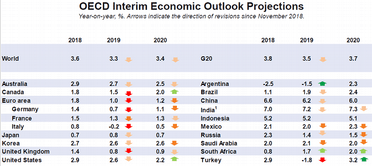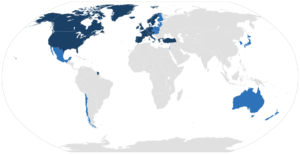Die OECD hat soeben ihre Erwartungen für das globale Wirtschaftswachstum gesenkt von zuvor +3,5% auf nun nur noch +3,3%.
Grund dafür seien Schwäche der chinesischen unn europäischen Wirtschaft, der „slowdown“ bei Handel und Gewerbe, hohe politische Unsicherheiten und Risiken an den Finanzmärkten:
„Economic prospects are now weaker in nearly all G20 countries than previously anticipated. Vulnerabilities stemming from China and the weakening European economy, combined with a slowdown in trade and global manufacturing, high policy uncertainty and risks in financial markets, could undermine strong and sustainable medium-term growth worldwide.“
Dabei entfallen die Senkungen vor allen auf Europa:
– Deutschland von Erwartung zuvor +1,6% auf nun nur noch +0,7% in 2019
– Italien dürfte in 2019 um -0,2% schrumpfen
– die Eurozone dürfte laut OECD in 2019 nur noch um +1,0% wachsen (zuvor Erwartung +1,8%).
„Downward revisions from the previous Economic Outlook in November 2018 are particularly significant for the euro area, notably Germany and Italy, as well as for the United Kingdom, Canada and Turkey“, so die OECD.
Insgesamt ein Reigen an Senkungen:
Downgrades galore. pic.twitter.com/DdNRsEtSrq
— ForexLive (@ForexLive) March 6, 2019

(Grafik: OECD; durch anklicken vergrößern)
Die OECD hält die abwartende Haltung der Notenbanken für richtig, warnt vor weiteren Beschränkungen des Handels (eine Spitze gegen Trump!) – und fordert, wie sollte es anders sein, fiskalischen Stimulus und weitere Strukturreformen:
The Outlook identifies the Chinese and European slowdown, as well as the weakening of global trade growth, as the principal factors weighing on the world economy. It underlines that further trade restrictions and policy uncertainty could bring additional adverse effects on global growth. While policy stimulus is expected to help offset weak trade developments in China, risks remain of a sharper slowdown that would hit global growth and trade prospects.
“The global economy is facing increasingly serious headwinds,” said OECD Chief Economist Laurence Boone. “A sharper slowdown in any of the major regions could derail activity worldwide, especially if it spills over to financial markets. Governments should intensify multilateral dialogue to limit risks and coordinate policy actions to avoid a further downturn,” Ms Boone said.
The Outlook calls on central banks to remain supportive, but stresses that monetary policy alone cannot resolve the downturn in Europe or improve the modest medium-term growth prospects. A new coordinated fiscal stimulus in low-debt European countries, together with renewed structural reforms in all euro area countries would add momentum to a growth rebound, boost productivity and spur wage growth over the medium term.

By Cflm001 (talk) – Own work.*Derived from by Emuzesto, released under CC-BY-SA-2.0.*Map derived from as of version 14 August 2014.*Coloured using Inkscape., CC BY-SA 2.0, https://commons.wikimedia.org/w/index.php?curid=7623675
Kommentare lesen und schreiben, hier klicken












